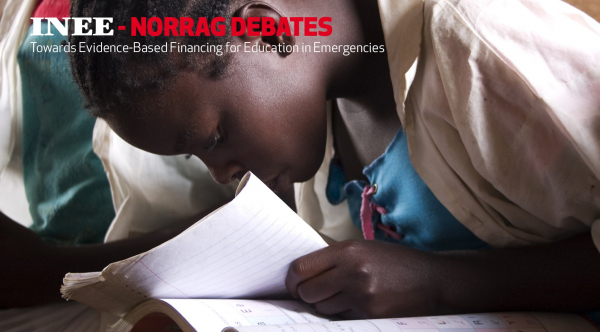Towards Evidence-Based Financing for Education in Emergencies
This page introduces a blog series by NORRAG and INEE to promote discussion of and explore the linkages between financing and evidence for education in emergencies (EiE).
 The strikingly low share of international humanitarian funding allocated to education is not sufficient to support the unprecedented need of children in crisis contexts. As the average length of displacement increasingly exceeds the duration of a typical basic education cycle, business-as-usual approaches to EiE and funding have shown their limits. How do we ensure sufficient funding for EiE? Can we identify what works in EiE and develop an evidence-based approach to funding it? This blog series will invite EiE experts to engage with relevant questions on intersections between increasing EiE financing and strengthening the EiE evidence base.
The strikingly low share of international humanitarian funding allocated to education is not sufficient to support the unprecedented need of children in crisis contexts. As the average length of displacement increasingly exceeds the duration of a typical basic education cycle, business-as-usual approaches to EiE and funding have shown their limits. How do we ensure sufficient funding for EiE? Can we identify what works in EiE and develop an evidence-based approach to funding it? This blog series will invite EiE experts to engage with relevant questions on intersections between increasing EiE financing and strengthening the EiE evidence base.
Discussion Series Contributors and Topics
- Towards Evidence-Based Financing for Education in Emergencies by INEE and NORRAG
- Why we should all be researcher-advocates by Jo Kelcey and Christine Monaghan, New York University
- Time to act: Calculating & securing the finances to fund education for the world's refugees by Emma Wagner, Save the Children
- We Need More and Better Data on Education a call to action issued by UNESCO UIS
- Investing in internally displaced children’s education is investing in their future by the Internal Displacement Monitoring Centre a call to action from IDMC at the July 2019 High-Level Political Forum
Join the Discussion
NORRAG and INEE seek to engage their respective members to think critically about EiE financing and evidence, to bring many voices to the table, and to share their expertise.
This blog series, which will run throughout 2018 and 2019, hopes to foster dialogue around questions such as:
- What is evidence in the field of EiE, and how should evidence inform funding decisions?
- How to develop evidence-based national strategies against the backdrop of urgency, limited data, and funding gaps?
- How should we balance the frontline urgency for responses with the deliberation and time needed to generate robust evidence?
- How can implementers build in funding for research and evidence when they can barely cover program implementation costs?
- How can we improve connections between research, policy, and practice?
- How can we increase evidence uptake, and what role should all stakeholders – academics, practitioners, Ministries of Education, NGOs, and donors – play in strengthening the evidence base?
- What are the most sustainable forms of EiE financing?
These are just a few of the questions NORRAG and INEE aim to highlight in this series. We welcome your voices and look forward to engaging in this important dialogue.
Ways to engage
- Write a blog post on the topic. Contact Sonja Anderson at [email protected].
- Comment and discuss with the authors and other readers. Visit the original post on the NORRAG website to leave comments.
- Share the blog posts with your colleagues and networks.
For more information, contact [email protected] or [email protected].
NORRAG is a global membership-based network of international policies and cooperation in education, established in 1986. NORRAG’s core mandate and strength is to produce, disseminate and broker critical knowledge and to build capacity among the wide range of stakeholders who constitute its network. NORRAG contributes to enhancing the conditions for participatory, informed, and evidence-based policy decisions that improve equity and quality of education. Learn more at www.norrag.org.
INEE is an open, global network of UN agencies, NGOs, donors, governments, universities, schools, and affected populations working together to ensure all persons the right to quality education in emergencies. Founded in 2000, INEE serves its members through community building, convening diverse stakeholders, knowledge management, advocating and amplifying ideas and knowledge, facilitating collective action, and providing members with resources and support. Learn more at www.inee.org.
Disclaimer: Both NORRAG and INEE offer spaces for dialogue about issues, research, and opinion on education and development. The views and factual claims made in the posts in this joint NORRAG-INEE blog series are the responsibility of their authors and are not necessarily representative of NORRAG’s or INEE’s opinions, policy, or activities.



